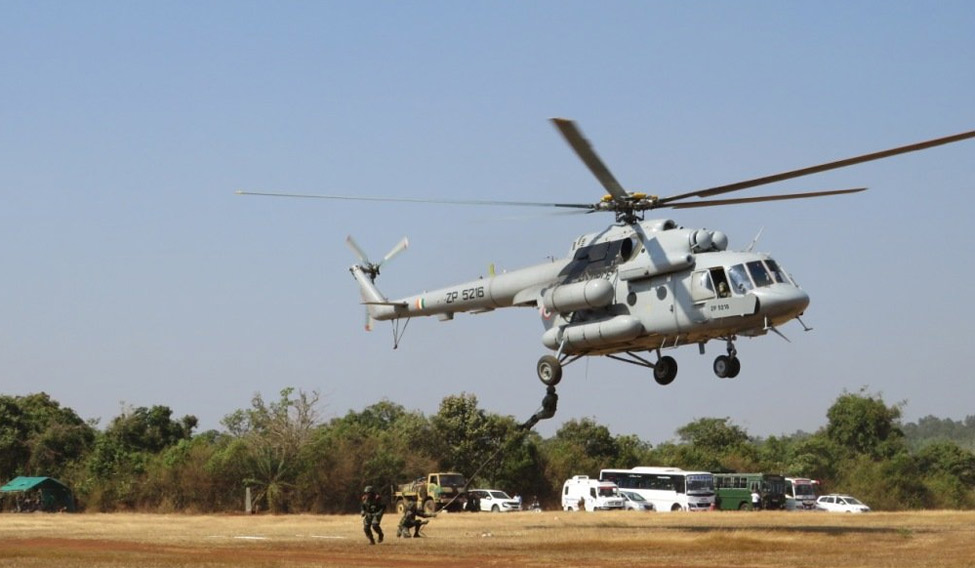"We have decided to respond in the same coin, and quickly," a senior army officer sitting in the Army Headquarters told THE WEEK, giving his reaction to the Indian Army's cross-border raid on Pakistani Army posts to avenge the recent killing of four Indian Army men, including an officer of the rank of major.
According to the military establishment, the Indian Army over a period of time, especially after the June 2015 'hot pursuit' into Myanmar, has changed its strategy to react immediately to enemy action. And also to publicly acknowledge it.
"Nowadays, we are always in 'hurry' to react. It not only sends a message to the outside world, but is also good for the morale of the unit and to bring back its confidence, as it lost its men in enemy action,"an officer explained.
The Army was rattled by the deadly ambush on a convoy of 6 Dogra Regiment in a border district of Manipur that killed 18 soldiers in June 2015. Days later, special forces of the Indian Army carried out a cross-border operation and neutralised 30-40 NSCN (K) insurgents hiding in the jungles of Myanmar. Calling it a 'hot pursuit', the then Director General of Military Operations, Lt. General Ranbir Singh, came out on camera and claimed to have inflicted massive damage to the insurgent camps.
And a similar strategy was adopted last year after the September 18 attack on the Uri brigade, in which 19 Indian Army troops were killed by militants with the help of regulars of the Pakistani Army. Exactly 10 days later, the Indian Army carried out a 'surgical strike' in Pakistan-occupied Kashmir and caused massive damage to the militant camps based in the area. And the same Lt. General Ranbir Singh came out with a statement before the media, publicly admitting to the cross-border commando operation on enemy soil.
"From Myanmar to the surgical strike, we have adopted a strategy to take revenge as early as possible. And our stance was also changed and we don't hesitate to admit our soldiers' daring act. Over a period of time, it has become a norm to react immediately,"said a senior army officer, while adding that political leadership has left the decision with the Army to respond in a manner it wants to.
Speaking with authority and command, Army Chief General Bipin Rawat recently told in a public event that the Indian Army will not hesitate to repeat surgical strikes. "The surgical strike was conducted to send a message and if our adversaries do not understand, it will be repeated,” the Army Chief reportedly said.
Army sources also maintained that it has become a necessity to admit to operations publicly before it takes a wrong sentiment. They gave the example of the beheading of two Indian soldiers in January 2013 by a border action team comprising militants and regulars from the Pakistani Army. The then Army Chief General Bikram Singh reportedly responded by saying that Indian Army will take action at the time and place of its choice. Eventually, it led to lot of public anger and put the political leadership under pressure.
While explaining about the situation on the Line of Control, Army sources claim that the present year of 2017 has seen the maximum number of ceasefire violations by the Pakistani Army in comparison with previous years.
According to the figures available with the establishment, the Pakistani Army has violated the ceasefire along the International Border and the Line of Control in Jammu and Kashmir more than 720 times this year, the highest in the past seven years. Last year, the Pakistani Army violated the ceasefire 221 times on the LoC, while the 2015 figure was only 60 such incidents. Repeated firing on the border led to the killing of 61 Indian troops in 2017.
"This year, the number, intensity and calibre of ceasefire violations have been so high. We also decided to respond in the same manner, which led to increase in number of casualties on both sides," an officer told THE WEEK.
Major Moharkar Prafulla Ambadas, Lance Naik Gurmail Singh, Sepoy Gurmeet Singh and Sepoy Pargat Singh, belonging to 2 Sikh Regiment and posted in Chingus area of Rajouri, were killed in the border action team action carried out by the regulars of Pakistani Army, along with militants, on December 23.
Within hours, the Poonch Brigade of the Indian Army launched a cross-border attack with five-seven commandos of its Ghatak unit and targeted posts of the 59 Baloch Regiment under 2 PoK Brigade, also called as Rawalkot Brigade of the Pakistani Army. There were at least three confirmed casualties and one injured, but unconfirmed reports claim casualties could be more.
Without calling it a surgical strike, a senior defence ministry official told that it was a 'local tactical level' action taken by the local commanders of the brigade level. “It was a short-distance raid about 200-300 metres inside the LoC,” the official explained.
Army sources claim that Sunday's strike was in retaliation to the Pakistani Army's action, in which they infiltrated into the Indian side by nearly 400 meters to target Indian soldiers.
“It was a tit-for-tat action involving selective targeting. Such actions do not last very long. The commandos targeted a group of Pakistani soldiers on patrol near a temporary post. An explosion was triggered near the Pakistani patrol, which may have led to the killing of Pakistani soldiers," the officer added.
An officer maintained that such tactical-level operations keep happening on the border, especially when the situation is volatile. However, the tactics have changed. Instead of waiting for the enemy to be less alert or careful, the Indian Army is retaliating 'quickly and strongly'.





